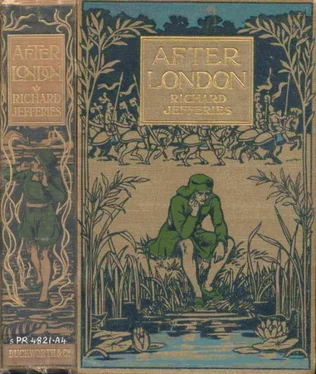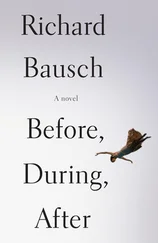Richard Jefferies - After London
Здесь есть возможность читать онлайн «Richard Jefferies - After London» весь текст электронной книги совершенно бесплатно (целиком полную версию без сокращений). В некоторых случаях можно слушать аудио, скачать через торрент в формате fb2 и присутствует краткое содержание. Город: London, Год выпуска: 1905, Издательство: Duckworth & Co., Жанр: sf_postapocalyptic, на английском языке. Описание произведения, (предисловие) а так же отзывы посетителей доступны на портале библиотеки ЛибКат.
- Название:After London
- Автор:
- Издательство:Duckworth & Co.
- Жанр:
- Год:1905
- Город:London
- ISBN:нет данных
- Рейтинг книги:4 / 5. Голосов: 1
-
Избранное:Добавить в избранное
- Отзывы:
-
Ваша оценка:
- 80
- 1
- 2
- 3
- 4
- 5
After London: краткое содержание, описание и аннотация
Предлагаем к чтению аннотацию, описание, краткое содержание или предисловие (зависит от того, что написал сам автор книги «After London»). Если вы не нашли необходимую информацию о книге — напишите в комментариях, мы постараемся отыскать её.
(1885), set in a future in which urban civilization has collapsed after an environmental crisis.” (From
).
This eBook is for the use of anyone anywhere at no cost and with almost no restrictions whatsoever. You may copy it, give it away or re-use it under the terms of the Project Gutenberg License included with this eBook or online at
* * *
After London — читать онлайн бесплатно полную книгу (весь текст) целиком
Ниже представлен текст книги, разбитый по страницам. Система сохранения места последней прочитанной страницы, позволяет с удобством читать онлайн бесплатно книгу «After London», без необходимости каждый раз заново искать на чём Вы остановились. Поставьте закладку, и сможете в любой момент перейти на страницу, на которой закончили чтение.
Интервал:
Закладка:
Under the books, in one corner of the chest, was a leather bag containing four golden sovereigns, such as were used by the ancients, and eighteen pieces of modern silver money, the debased shillings of the day, not much more than half of which was silver and the rest alloy. The gold coins had been found while digging holes for the posts of a new stockade, and by the law should have been delivered to the prince’s treasury. All the gold discovered, whether in the form of coin or jewellery, was the property of the Prince, who was supposed to pay for its value in currency.
As the actual value of the currency was only half of its nominal value (and sometimes less), the transaction was greatly in favour of the treasury. Such was the scarcity of gold that the law was strictly enforced, and had there been the least suspicion of the fact, the house would have been ransacked from the cellars to the roof. Imprisonment and fine would have been the inevitable fate of Felix, and the family would very probably have suffered for the fault of one of its members. But independent and determined to the last degree, Felix ran any risk rather than surrender that which he had found, and which he deemed his own. This unbending independence and pride of spirit, together with scarce concealed contempt for others, had resulted in almost isolating him from the youth of his own age, and had caused him to be regarded with dislike by the elders. He was rarely, if ever, asked to join the chase, and still more rarely invited to the festivities and amusements provided in adjacent houses, or to the grander entertainments of the higher nobles. Too quick to take offence where none was really intended, he fancied that many bore him ill-will who had scarcely given him a passing thought. He could not forgive the coarse jokes uttered upon his personal appearance by men of heavier build, who despised so slender a stripling.
He would rather be alone than join their company, and would not compete with them in any of their sports, so that, when his absence from the arena was noticed, it was attributed to weakness or cowardice. These imputations stung him deeply, driving him to brood within himself. He was never seen in the courtyards or ante-rooms at the palace, nor following in the train of the Prince, as was the custom with the youthful nobles. The servility of the court angered and disgusted him; the eagerness of strong men to carry a cushion or fetch a dog annoyed him.
There were those who observed this absence from the crowd in the ante-rooms. In the midst of so much intrigue and continual striving for power, designing men, on the one hand, were ever on the alert for what they imagined would prove willing instruments; and on the other, the Prince’s councillors kept a watchful eye on the dispositions of every one of the least consequence; so that, although but twenty-five, Felix was already down in two lists, the one, at the palace, of persons whose views, if not treasonable, were doubtful, and the other, in the hands of a possible pretender, as a discontented and therefore useful man. Felix was entirely ignorant that he had attracted so much observation. He supposed himself simply despised and ignored; he cherished no treason, had not the slightest sympathy with any pretender, held totally aloof from intrigue, and his reveries, if they were ambitious, concerned only himself.
But the most precious of the treasures in the chest were eight or ten small sheets of parchment, each daintily rolled and fastened with a ribbon, letters from Aurora Thyma, who had also given him the ivory cross on the wall. It was of ancient workmanship, a relic of the old world. A compass, a few small tools (valuable because preserved for so many years, and not now to be obtained for any consideration), and a magnifying glass, a relic also of the ancients, completed the contents of the chest.
Upon a low table by the bedstead were a flint and steel and tinder, and an earthenware oil lamp, not intended to be carried about. There, too, lay his knife, with a buckhorn hilt, worn by everyone in the belt, and his forester’s axe, a small tool, but extremely useful in the woods, without which, indeed, progress was often impossible. These were in the belt, which, as he undressed, he had cast upon the table, together with his purse, in which were about a dozen copper coins, not very regular in shape, and stamped on one side only. The table was formed of two short hewn planks, scarcely smoothed, raised on similar planks (on edge) at each end, in fact, a larger form.
From a peg driven into the wall hung a disc of brass by a thin leathern lace; this disc, polished to the last degree, answered as a mirror. The only other piece of furniture, if so it could be called, was a block of wood at the side of the table, used as a chair. In the corner, between the table and the window, stood a long yew bow, and a quiver full of arrows ready for immediate use, besides which three or four sheaves lay on the floor. A crossbow hung on a wooden peg; the bow was of wood, and, therefore, not very powerful; bolts and square-headed quarrels were scattered carelessly on the floor under it.
Six or seven slender darts used for casting with the hand, as javelins, stood in another corner by the door, and two stouter boar spears. By the wall a heap of nets lay in apparent confusion, some used for partridges, some of coarse twine for bush-hens, another, lying a little apart, for fishes. Near these the component parts of two turkey-traps were strewn about, together with a small round shield or targe, such as are used by swordsmen, snares of wire, and, in an open box, several chisels, gouges, and other tools.
A blowtube was fastened to three pegs, so that it might not warp, a hunter’s horn hung from another, and on the floor were a number of arrows in various stages of manufacture, some tied to the straightening rod, some with the feathers already attached, and some hardly shaped from the elder or aspen log. A heap of skins filled the third corner, and beside them were numerous stag’s horns, and two of the white cow, but none yet of the much dreaded and much desired white bull. A few peacock’s feathers were there also, rare and difficult to get, and intended for Aurora. Round one footpost of the bed was a long coil of thin hide, a lasso, and on another was suspended an iron cap, or visorless helmet.
There was no sword or lance. Indeed, of all these weapons and implements, none seemed in use, to judge by the dust that had gathered upon them, and the rusted edges, except the bow and crossbow and one of the boar spears. The bed itself was very low, framed of wood, thick and solid; the clothes were of the coarsest linen and wool; there were furs for warmth in winter, but these were not required in May. There was no carpet, nor any substitute for it; the walls were whitewashed, ceiling there was none, the worm-eaten rafters were visible, and the roof tree. But on the table was a large earthenware bowl, full of meadow orchids, blue-bells, and a bunch of may in flower.
His hat, wide in the brim, lay on the floor; his doublet was on the wooden block or seat, with the long tight-fitting trousers, which showed every muscle of the limb, and by them high shoes of tanned but unblacked leather. His short cloak hung on a wooden peg against the door, which was fastened with a broad bolt of oak. The parchment in the recess of the window at which he had been working just before retiring was covered with rough sketches, evidently sections of a design for a ship or galley propelled by oars.
The square spot of light upon the wall slowly moved as the sun rose higher, till the ivory cross was left in shadow, but still the slumberer slept on, heedless, too, of the twittering of the swallows under the eaves, and the call of the cuckoo not far distant.
CHAPTER II
THE HOUSE OF AQUILA
Интервал:
Закладка:
Похожие книги на «After London»
Представляем Вашему вниманию похожие книги на «After London» списком для выбора. Мы отобрали схожую по названию и смыслу литературу в надежде предоставить читателям больше вариантов отыскать новые, интересные, ещё непрочитанные произведения.
Обсуждение, отзывы о книге «After London» и просто собственные мнения читателей. Оставьте ваши комментарии, напишите, что Вы думаете о произведении, его смысле или главных героях. Укажите что конкретно понравилось, а что нет, и почему Вы так считаете.












